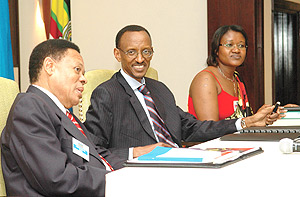NYARUGENGE - President Paul Kagame has urged East African Community member States to re-energize and re-commit themselves in tackling challenges facing the institutions of the bloc in order to speed up the integration process. Kagame, who is also the chairperson of the EAC Head of States Summit, sounded the call while presiding over the opening of a Two-day EAC Strategy Retreat for key organs and institutions which opened yesterday at Kigali Serena Hotel. The retreat, the first of its kind, has brought together heads of institutions and organs of the EAC, and is aimed at mapping out collaborative efforts and proactive approaches that can empower the institutions and organs of the bloc to speed up the integration process.


NYARUGENGE - President Paul Kagame has urged East African Community member States to re-energize and re-commit themselves in tackling challenges facing the institutions of the bloc in order to speed up the integration process.
Kagame, who is also the chairperson of the EAC Head of States Summit, sounded the call while presiding over the opening of a Two-day EAC Strategy Retreat for key organs and institutions which opened yesterday at Kigali Serena Hotel.
The retreat, the first of its kind, has brought together heads of institutions and organs of the EAC, and is aimed at mapping out collaborative efforts and proactive approaches that can empower the institutions and organs of the bloc to speed up the integration process.
Delivering a key note address of the day, Kagame said it was high time the EAC joined hands to enhance the integration process if member States are to reap the expected benefits of integration which can only be done by addressing the challenges facing the institutions and organs of the bloc.
He added that that the Kigali meeting is an opportunity for the members to dig deep and come up with valuable contributions towards finding the essential ingredients to make stronger and effective institutions that the EAC demands and deserves.
"It is fitting that at this first EAC Retreat, we ask ourselves two basic questions that may help put in context why this working session is vital. Why do nations integrate, and what factors enable them to achieve this goal? What type of institutions and organisations get the job done, or conversely, why do some of them do poorly or even fail in their missions?” pondered Kagame.
He referred to the new EAC as a ‘second generation’ regional integration attempt of East Africa, which presents the members States with another opportunity to review where it all went wrong in the first attempt in order to make the current process successful.
He appealed to member states to consider incorporating the retreat into the regular work plan of the EAC, to make it an annual platform to discus, adopt a learning attitude, and continuously internalise new knowledge, innovation and good practices aimed at building first rate institutions that will drive the East African integration process to another level.
Kagame said that the bloc will be assured of achieving better outcomes from the integration especially the benefits of larger markets, economies of scale, larger pools of human, financial, and physical capital.
The President underscored the importance of the rich legacies of socio-economic, political and cultural interactions that exist among East Africans that are being strengthened by formal institutions as they are vital in making the 120m people in the EAC one.
He also stressed the benefits which come with enhanced integration such as the removal of barriers to trade, the increased movement of investment, people, goods, labour, and employment opportunities which are all expected to bring fundamental changes in the bloc.
Kagame called upon all principle institutions and organs of the EAC to adopt business friendly attitudes and practices especially regarding providing respective competency to promote wealth-creation.
The EAC Secretary General Juma Mwapachu commended Kagame for organising a retreat which will not only be an opportunity to mend the broken links in the bloc but also a chance to churn out concrete actions to make the EAC integration engine run faster.
The Rwandan Minister of East African affairs, Monique Mukaruliza, who is also the chair of the EAC Council of Ministers, also expressed optimism that the 2 day event will yield positive working solutions that will render EAC institutions more effective and efficient in their operations.
Ends


